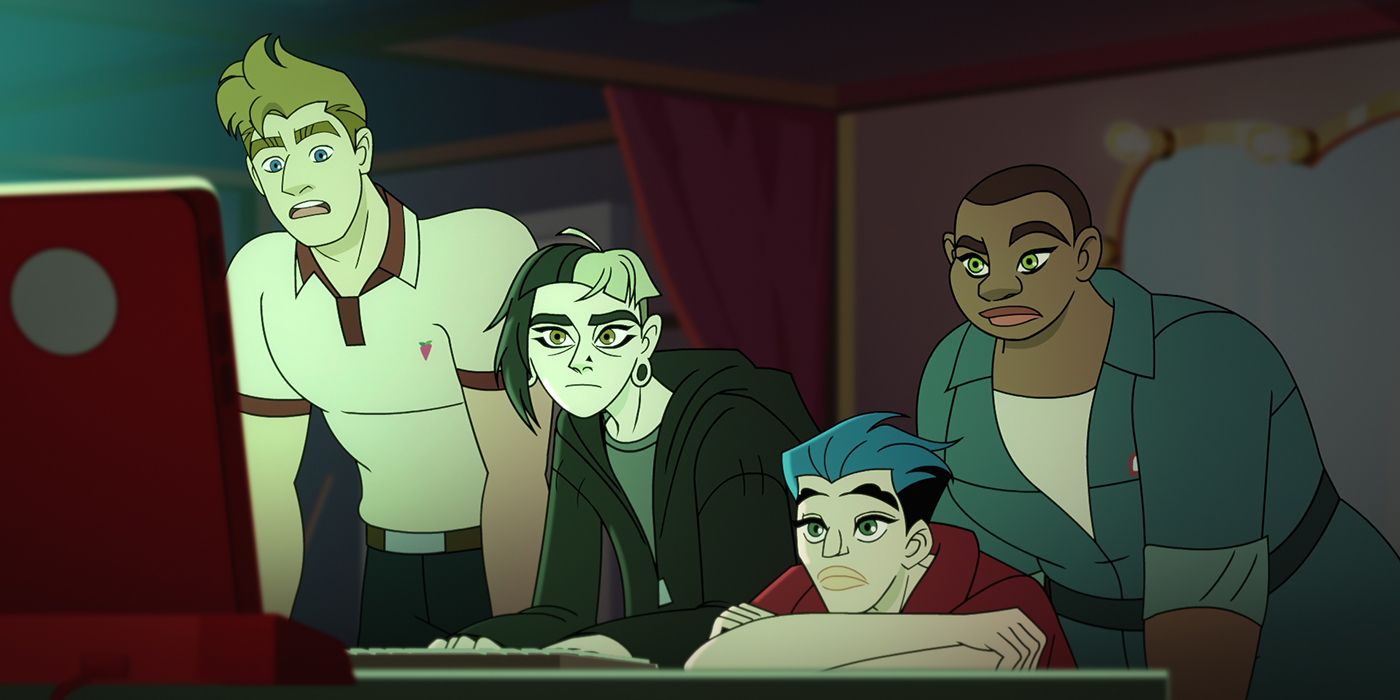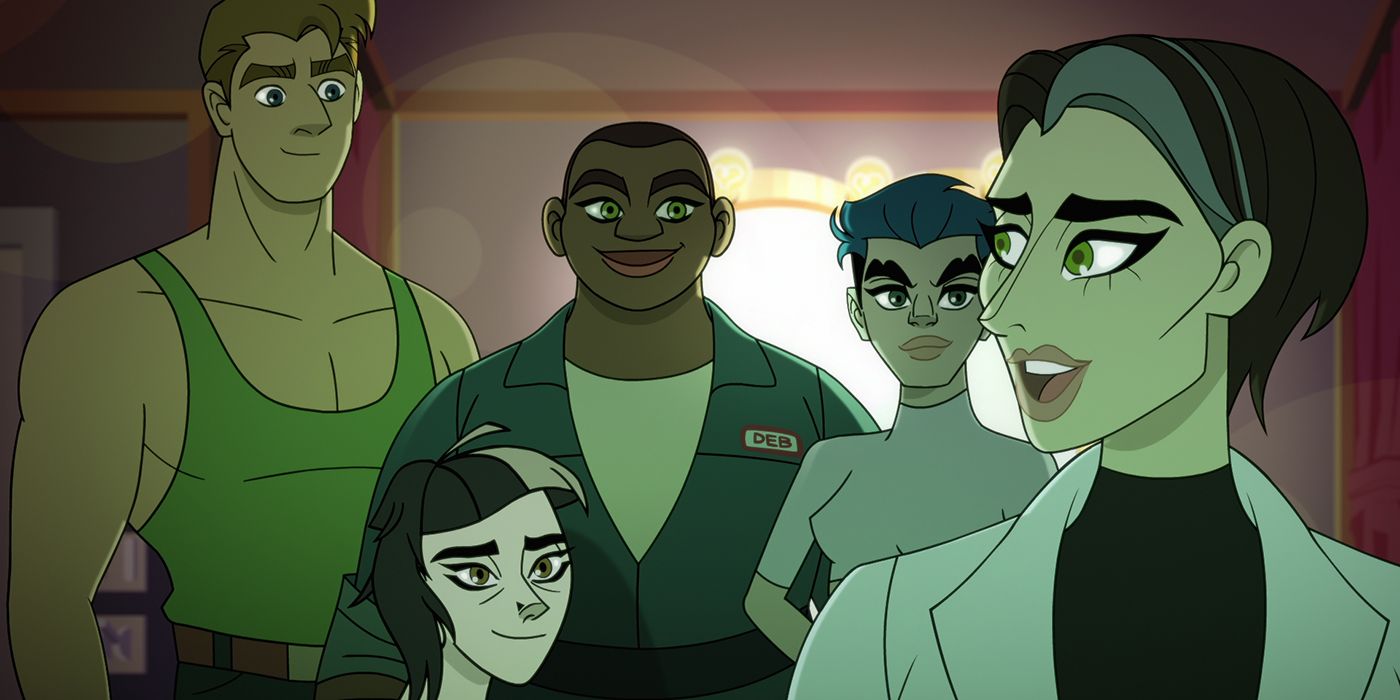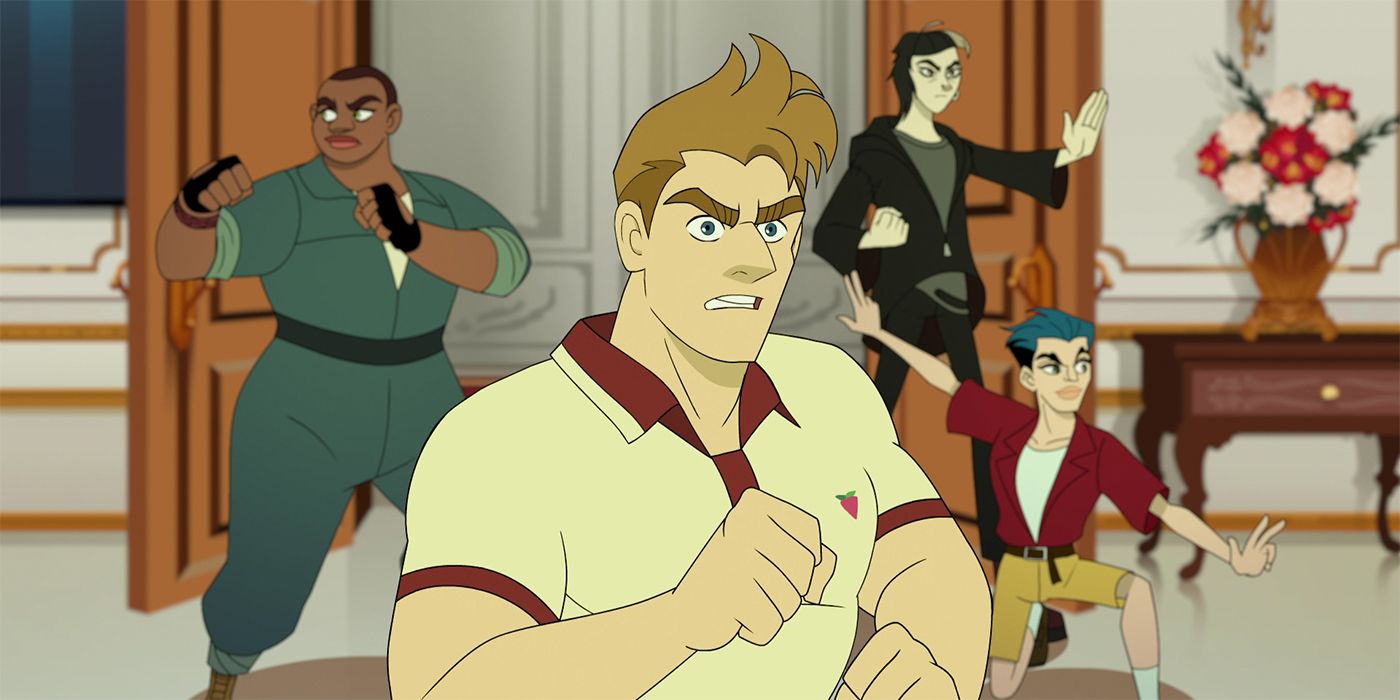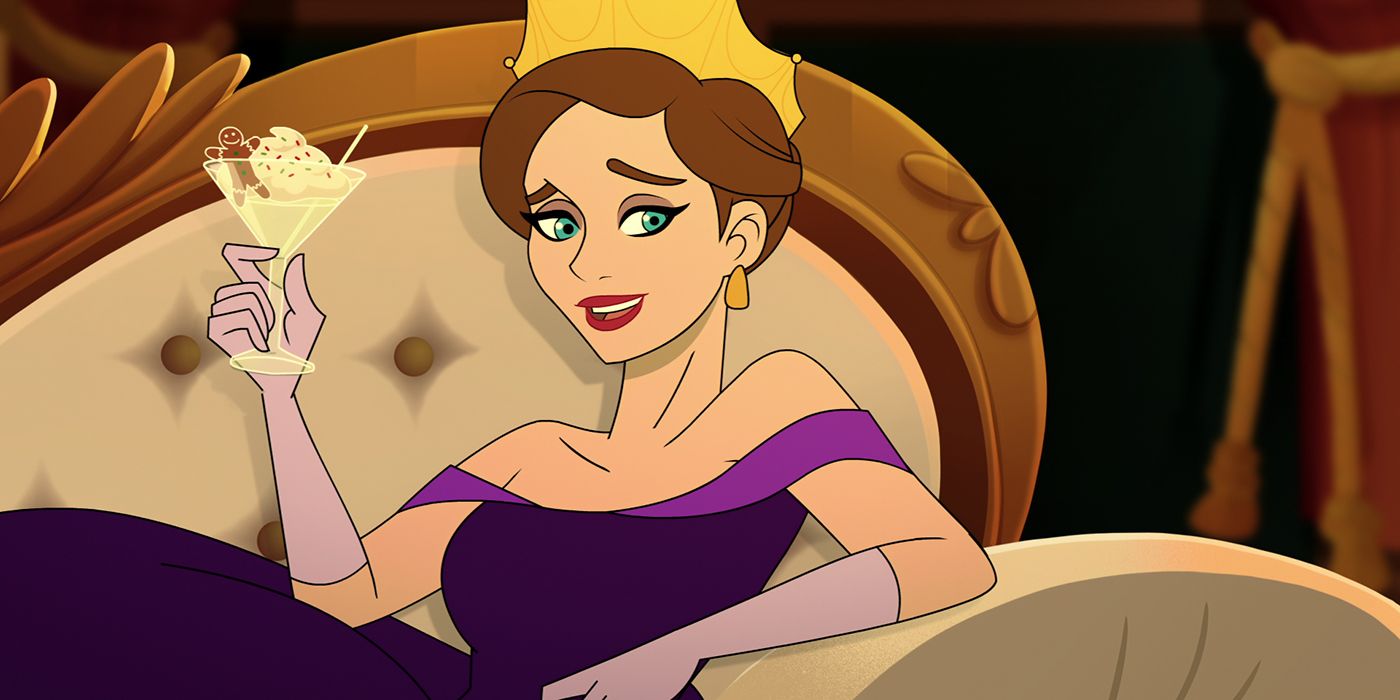
After years of anticipation, Q-Force is finally coming to Netflix on September 2. The 10-episode animated series, created by Gabe Liedman and executive produced by Mike Schur (The Good Place), centers on an unlikely team of overlooked LGBT superspies who make their presence known after a decade of neglect.
Steve Maryweather (voiced by Sean Hayes, who also serves as EP) is known to fellow spies as "Agent Mary," and he is as capable as they come. Despite this, he has yet to break through the agency's prejudice and land his first big mission. Instead, he and his scrappy team - known as the Q-Force - are left to waste away in West Hollywood, where nothing happens. That is, until they make their first big case happen.
Liedman spoke to Screen Rant about the journey that led to the series, the collaboration process with Hayes, and some of the inspirations behind specific characters and plot points for the first season.

Screen Rant: What first sparked the conversation that led to Q-Force? It almost feels like a spiritual successor to Brooklyn Nine-Nine, but now we're secret agents.
Gabe Liedman: There's definitely some Brooklyn Nine-Nine DNA in there. I worked for Brooklyn Nine-Nine for the first three seasons, so about 70 episodes. And Q-Force is executive produced by Mike Schur, who co-created Brooklyn Nine-Nine and was one of my bosses there. I definitely learned a lot storytelling-wise there, and sort of vibe-wise too. But the show actually existed a little bit outside of the Mike Schur-verse.
Sean Hayes, the star and EP of the show, and his producing partner Todd Milliner had the very beginning seed of an idea for this show. They were just calling it quote-unquote "gay James Bond." The idea of a gay James Bond was something that Sean and Todd really thought would be a great project for Sean, and they were starting to meet writers to develop it.
Sean was a fan of my stand-up, which is mind-blowing to me, and called me in to meet. I love action movies, and I love James Bond and Jason Bourne. That genre is just everything to me, so I really leapt at the idea to develop it. They gave me some time to go away and think about it, and what I came back to them with was Q-Force, which isn't just gay James Bond, it's the whole squad.
One of the biggest revelations I had, when I was just trying to figure it out, was there isn't going to be a gay James Bond. This macho world is not welcoming, so even if this guy is James Bond on paper, he's not going to be given the same shot. He's gonna have to prove himself, and it's going to be an uphill battle. That just spelled comedy to me.
And that's where Q-Force came from. Mike came on as a producer, I came on as the creator, and we all pitched it together and developed it together.
You're the creator and you write for it, but you also play the role of Benji. How does that affect your work? Is there a feedback loop there, where your writing directly inspires your performance and vice versa?
Gabe Liedman: Absolutely. I've been in writers' rooms for a long time now, but before I ever stepped foot in a writers' room, my whole life was stand-up comedy. I am very much a performer and love being on stage and acting. Writing and producing is another thing that I love, and it's what I was able to build a career out of first.
You only build these careers by focusing on them 100%, so I wasn't going on auditions and all that stuff. This just felt like an opportunity to get back into acting, this thing that I love, and develop this little part for myself.
I love the relationship between Steve and Benji because it's really sweet and shows you a different side of Steve. Can you talk about peeling back the layers of your protagonist through it and over the course of the season?
Gabe Liedman: Yeah. I think that Agent Mary [Steve] is a very heightened character, but he's also a version of me. He's the overachiever; he's the one who is overly focused on achievement. So, I thought this very funny and kind of creepy starting place for him was that he's been obsessed with this one challenge for 10 years. He hasn't really let himself live.
Then I thought that a love story would be the perfect way to watch this incredibly skilled, incredibly intelligent person kind of step in it. He's been having sex, we know that, but he hasn't been in love. So, I thought that it would be a cool thing to watch him trying to do that for the first time and like it, and then do what he can to save it. This is a workplace comedy, but I wanted these to be real people. That's why a lot of the main characters have love stories.

Speaking of love stories, Deb's relationship with her wife is so wholesome. I adore how happy they are together, even when the relationship is surrounded by spy problems. How purposeful was it to write romance that is essentially problem-free on its own?
Gabe Liedman: When I write, I like to kind of base the characters on real people. Deb, Wanda Sykes' character, is actually based on one of my very best friends in the entire world, who is the woman that plays her wife Pam.
She is in a very loving marriage, and she is kind of the rock in my life. She's someone I really lean on and someone I really look to for stability, even though she's a kook. I used that as a jumping-off point, and I also really wanted Deb to be the same - one who is incredibly weird in this incredibly weird world. Her interests are very strange, and she has a lot of quirks.
But I wanted Agent Mary to have someone that he could lean on the way I lean on this woman, Ali [Liebegott], and find stability. That was the starting place there and casting Ali as Pam was such a fun, full-circle moment. I think her performance is so funny; she's a really good actor.
I just wanted to show a counterpoint: Agent Mary is falling in love for the first time, so what could it look like? But I also wanted to be careful to not make it perfect. Because that's just not realistic, and I don't think that that would have been doing Wanda any service. She needs something fun to play.
Sean is an EP as well as playing Agent Mary. What is the collaboration process like with him, and do you have discussions about characterization or plot decisions?
Gabe Liedman: There was a lot of back and forth. It was really important to me that he be proud of the character and really be excited to play him. Even though I'm the one who created the show, there's no show without him, you know.
He's also just this incredibly generous, incredibly funny person. He's someone I grew up watching on Will & Grace, and my husband makes fun of me when we watch reruns. Whenever he learns a joke, I always say, "Olympic level!" That is just how I think of him: 12 out of 10. No one can touch him. So, it was important for me to impress him and to make sure he had fun. And he was really generous with it.
The life of a writer is oftentimes begging actors to say certain lines and explaining to them why they need to say it for the story and stuff. And there was none of that was Sean. He just was super fun and on-board and prepared and great.
I love mentor relationships, which are also a staple of Bond films - thank you, Dame Judi Dench. V (Laurie Metcalf) and Steve certainly follow that trend, and their dynamic started in a surprising and interesting way, where we weren't sure if she had his back. Can you talk about how you approached this mentorship?
Gabe Liedman: My starting place for their relationship was kind of a parental one. Yes, there's a professional mentoring, but I feel like you can feel her heartbreak in the pilot. That to me was really important: it's a heartfelt relationship, it's loving, and it's parental.
But I also wanted to make sure that V was a cool part because there's a version of Q-Force out there in some parallel universe where she's just a suit behind a desk with three lines in every episode. But that didn't appeal to me. If I was an actor, I wouldn't make that part. It doesn't seem cool. So, I wanted to make sure she had a rich part to play.
That's why we built out her crazy mystery, which is maybe my favorite part of season 1. And it really went a lot further than I think people were ready for it to. I just found it really cool. That central relationship, to me, was kind of like a mother-son one. But it was getting to a place where they're equal, almost like when you figure out your parents are real people that have their own flaws.
Every single character is fantastic, but I have a soft spot for Stat (Patti Harrison) and Twink (Matt Rogers), especially because at first glance they seem very out of place in a superspy crew. How would you describe their positions in the team?
Gabe Liedman: When putting together the squad and putting together the show, what Sean and Mike and Todd, and I all agreed on was that it's only cool if they're doing stuff their way. If this is just any old squad that would just fight crime the way anyone else would, then what's the point of this show? That made me reach further to be like, "What are the skills that only queer people would bring to the table?" And that's really what informed their skill set.
As for their personalities, again, they're based on people I know in my life. I want to make them real and exuberant: Twink is representing gay cis men in my life, who I love so much. I have a friend who actually became a writer on the show, who's this goth trans woman who is so funny to me. Every reference she makes is something I've never heard of, but I can tell it's cool. And I want to know it because she's her. I very much based Stat on this woman in my life, who wrote for the show, Chloe Keenan. She was there for a million reasons, and she wrote a lot more than just Stat, but she was kind of my touchstone.

Not to give spoilers, but one of my favorite aspects of the season was Genorvya. What can you say about it, how it came about, and how you get away with it?
Gabe Liedman: Well, two different things. The starting place for it is pretty obvious: The Princess Diaries. As a writing team - there's a lot of us sitting around the table, making the show together - we tried to go for pop culture references that felt inherently queer, but weren't the ones that straight people would think. Jackée Harry as their poster in the dining room and stuff like that that aren't the most expected ones but rang really true to us. Casting Laurie Metcalf as V, for example. Talk about a gay icon that isn't who you'd expect.
The Princess Diaries just seemed like a very funny starting point that just cracked [us] up so hard. You know we asked Anne Hathaway if she wanted to play her, but it was a little bit of a minefield to get away with it as a parody that wasn't offensive to Disney - or so much so that they would come after us or anything.
But it was a very organic twist for us in the story. I'm not gonna say what happened, but we started her one way. And what you're seeing is us knowing the endpoint but not how we were going to get there. It was episode-by-episode storytelling, but it was a character that we were all in love with.
Casting Stephanie Beatriz from Brooklyn Nine-Nine as the Princess was [perfect]. I loved working with the entire cast of Brooklyn Nine-Nine but she, in a lot of ways, was a defining actor for me on that show. My days with her on set were just absolutely mind-blowing, and I knew that Rosa Diaz from Brooklyn Nine-Nine was only part of her range. Her range is incredible, but when I was like, "I really want Stephanie for the princess," a lot of people were like, "What the hell are you talking about?" because she hasn't gotten a chance to show everything yet. But I knew from working with her that she was the one for this. And I'm so impressed with her performance.
With characters like Buck (David Harbour) and Director Chunley (Gary Cole) and their perception of "Mary" versus the reality of Maryweather, there seems to be a meditation on traditional forms of masculinity and what it means to be a "virile man." Can you talk about your take on that from the writers' room perspective?
Gabe Liedman: Yeah, to me that just feels real. I think, in this day and age, a TV show in an intelligence agency can't make it look perfect - because that's not helping anyone. The surveillance state is weird, and the military is weird. And there are these old forms of power. How relevant are they and how much good are they? Those are the questions we all really needed to be asking ourselves the entire time to stick the landing on this.
As for the masculinity stuff, that also just feels real to me. There are generations of men, and also men of all different ages, who just feel a different way about masculinity. And their minds are closed to any argument about it - or they need to be proven wrong or something.
But we were really careful to not lump Buck and Chunley in together or to say that there's some sort of monolithic thing. I think Buck makes a lot more progress, and he also had a lot more screen time. So, it was really important to me and the rest of the writers that you love this guy by at least halfway through the season, if not by the end. Just in a Homer Simpson kind of way: he's not perfect, he's not even good, but it would get really old if he was saying the same thing in every scene. He needed to evolve a little bit in his own way, and I hope we found a creative way to do that.
All 10 episodes of Q-Force's first season premiere September 2 on Netflix.
from ScreenRant - Feed https://ift.tt/3kWHiJl

0 Comments